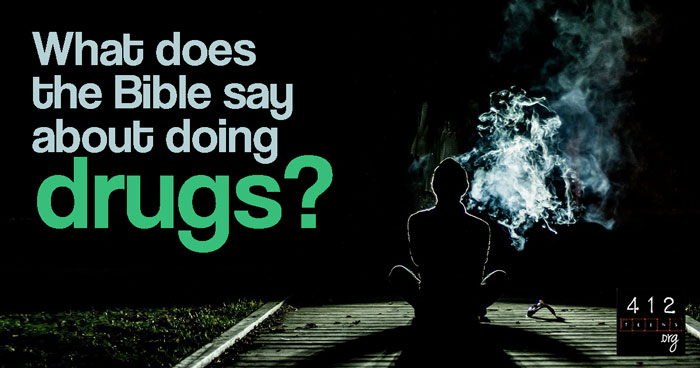What does the Bible say about using drugs? Is drug use a sin? Are legal drugs OK to use?

Whether on social media, the nightly news, or the buzz around school, it seems everyone is talking about drugs. There are any number of competing and often conflicting opinions about drugs and drug use—from strict prohibitionists to those who think unlimited access to any drug at any time for any person should totally be a thing. How can anyone decide where they stand on this provocative issue? Even more confusing is how often the "facts" seem to change. Is marijuana a "gateway drug" that leads many to use other drugs that risk grave danger to the user, or is it a relatively harmless way to relax with no concerning side effects? Only one source promises to be an unchanging voice in a cacophony of political and social noise: the Bible. So, just what does the Bible say about drug use?
Well, frustratingly, the Bible is silent about illicit drug use. Cocaine, heroin, ecstasy (MDMA), methamphetamines (meth), marijuana, cannabis, peyote, magic mushrooms, or acid (LSD) are not mentioned in the Bible. Nor does it talk about huffing, snorting, vaping, 34dropping, smoking, shooting, licking, or any other method of ingesting drugs. But don't despair, because there are biblical principles that can guide us in this important issue. Drug use touches many aspects of our lives that the Bible does speak to, like legality, stewardship, and sobriety. If we look at these issues in relation to drug use, I am confident we can make godly choices.
Drug Use & Legality
The Bible tells us that Christians must respect and obey their governmental laws, regardless of whether they agree with them or not (Ecclesiastes 8:2-5; Matthew 22:21; 23:2-3; Romans 13:1-7; Titus 3:1; 1 Peter 2:13-17). The ONLY instance in which disobedience to the law of the land may be allowed is when obeying man's law would cause you to break God's law (Daniel 3 and 6; Acts 5:29). Illicit drug use may very likely be illegal where you live, and to use drugs would be to break the law.
Of course, we realize that you may be reading this from anywhere in the world, and the laws regarding drug use are quite varied. In America, most illicit drugs are illegal, with a few exceptions in some states for medical or recreational use marijuana. Some countries, such as the Netherlands, have a much more liberal stance on drug use. That said, just because something's legal, that doesn't mean you should do it.
Illicit drug use (or improper prescription drug use) can easily lead to breaking other governmental laws or even God's law. Taking illicit drugs could result in making irresponsible or dangerous decisions which end up breaking other laws, such as driving under the influence of a drug that alters your perception and reaction time. Drug addicts often resort to theft, prostitution, robbery, and other crimes in order to support their expensive habit. Teens may have legal responsibilities such as a job or home responsibilities to care for their pets or siblings, but drug use often leads to feeling those responsibilities are no longer important, which may result in someone getting hurt. If a person chooses to use a drug that is legal for him or her to take, yet breaks laws because of this drug use, then that person is clearly outside of God's will.
Drug Use & Stewardship
You were born for a divine purpose. God has a plan for you—and that plan is to follow Him and serve His kingdom. He gave you many things to help you accomplish His plan: a body, a mind, a heart, talents, and skills, all to accomplish your destiny. He chose your family, where you'd be born, and placed you in the best position possible to fulfill your God-given purpose.
In our society, we tend to think of everything in relation to ourselves—it's my body, my choice, my dreams... God asks Christians to think of everything in terms of Him. It's His body He gave me, His purpose He created me for, His desires for my life... The Bible says, "for God bought you with a high price. So you must honor God with your body" (1 Corinthians 6:20).
When Jesus died on the cross for you, your ransom for sin was paid. You were adopted into God's family as His son or daughter. You must be a good steward (that means "take very good care") of everything He gives you—your body, your money, your talents. Drugs have physical impacts on our bodies, our minds, our motivation, our money, our talents. It all goes down the drain when we choose to abuse drugs. Anything that keeps us from serving God is stealing from Him.
Drug Use vs. Sobriety
Serving your purpose for God is serious business, and you don't want to sabotage yourself by blindly giving in to personal pleasures. God uses us to introduce Jesus to others. Sometimes that is through music or other talents. Sometimes that is through friendship. Sometimes that is through a career or ministry path. We all have a divine purpose. There are eternal consequences when Christians follow or disregard God's will for their lives (Galatians 6:7-8; Isaiah 59:2).
We must be sober-minded and humbled at the thought of being trusted by God to work for His kingdom. The Bible instructs Christians to "be serious and disciplined for prayer" (1 Peter 4:7). This doesn't mean that we can't ever have fun, but our fun should not impair our judgment or choices. Even Christian comedians, who bring truth to their audiences through laughter, can treat God's business as serious business.
Our focus should be centered around pleasing and serving God—pretty difficult to do when one is high, tweaked out, or searching for the next fix. Drug use robs us of our mindfulness. Study of the Bible and prayer, requirements for fulfilling God's purpose in our lives, are impossible when we are not in our right minds.
Drug Use & Escapism
Most people use drugs as a means of escaping a life or circumstances that are undesirable. Whether they are escaping a painful past, difficult present, or fearsome future, drug users are looking for comfort where they see no hope. As Christians, we have the Hope of the Lord who has saved us from an eternity of pain and misery with a promise of an eternity with Him without the difficulties and pain we experience on earth. Christians face extreme difficulties and pain too, so the lure of drugs and the promise of a respite in la-la land is a strong temptation.
But when we choose to not use drugs, to help and encourage one another instead, and to lead others to truth and clarity, we are fulfilling God's work for His Kingdom. And it is important, life-fulfilling (and -saving) work. The Bible reminds us:
"For the grace of God has appeared that offers salvation to all people. It teaches us to say "No" to ungodliness and worldly passions, and to live self-controlled, upright and godly lives in this present age, while we wait for the blessed hope—the appearing of the glory of our great God and Savior, Jesus Christ, who gave himself for us to redeem us from all wickedness and to purify for himself a people that are his very own, eager to do what is good." &,dash;Titus 2: 11-14
Therefore, I urge us all to be of one mind. To agree to follow God's plans as well as man's laws. To be good stewards of all God has given us. To remain alert to those around us, to God's calling for our lives, and to be serious about our work for God (even when we find the work fun!).
Life is too short to sit any of it out on the sidelines in an incapacitated state. Drug use is purposefully benching yourself when God wants to put you in the game. Play your game, and run your race!
ALSO SEE:


TL;DR
While Bible is silent on illicit drug use, we can still use biblical principles to make good choices about what we put in our bodies (1 Corinthians 6:20). Illegal activity is a no-brainer; we must follow the law (1 Peter 2:13-17). Being high on drugs can impair reaction time, good judgment, and ability to make wise choices, which can lead to sinful behavior. Christians must "be serious and disciplined for prayer" (1 Peter 4:7). This doesn't mean we can't have fun, but fun things should not be allowed to impair our discernment or wisdom (Titus 2: 11-14).

Writer: Rhonda Maydwell
Rhonda is an author, wife, mother, and mentor. She graduated from the University of Missouri with a degree in English and Religious studies. She loves studying God’s Word for truth and wisdom and uses it as a compass and roadmap for her own spiritual journey. Rhonda believes in sharing the Good News and the hope found in biblical truths with others. She uses her writing and mentoring opportunities (often with a pinch of humor) to do just that.
